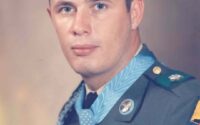NASA’s Golden Era: Historic Photos from the Glory Days of Space Exploration .m
 The early days of space exploration were marked by groundbreaking achievements, from historic Moon landings to awe-inspiring spacewalks.
The early days of space exploration were marked by groundbreaking achievements, from historic Moon landings to awe-inspiring spacewalks.
These iconic NASA images capture the spirit of an era when humanity took its first steps beyond Earth.
NASA’s origins can be traced back to the Cold War, a time when technological dominance was as much a battlefield as any other.
The launch of Sputnik in 1957 by the Soviet Union sent shockwaves through the United States, prompting a swift response. Determined to assert leadership in space, American officials recognized the need for a dedicated agency to propel the nation forward.

Before exploring space, NASA pilots prepared for the experience by flying high-altitude aircrafts. In this picture, a test pilot looks up as a B-52 soars over California in 1969.
In 1958, President Dwight D. Eisenhower signed the National Aeronautics and Space Act, officially establishing NASA.
This new agency was tasked with closing the gap between the U.S. and its Soviet counterparts, igniting what became known as the Space Race.
Over the next decade, NASA embarked on a series of ambitious programs, Mercury, Gemini, and Apollo, each designed to push the limits of space exploration.

Neil Armstrong stands in front of the X-15 rocket plane in 1960.
The Mercury program focused on achieving human spaceflight, successfully sending American astronauts into orbit.
Gemini followed, allowing crews to practice crucial maneuvers, conduct spacewalks, and refine the technology needed for lunar missions. These efforts culminated in the Apollo program, which turned the dream of reaching the Moon into reality.
The pinnacle of this era came on July 20, 1969, when Neil Armstrong and Buzz Aldrin became the first humans to set foot on the Moon, a moment that forever changed history.
The years that followed built on that triumph, with NASA continuing to push the boundaries of human spaceflight.

NASA astronaut Walter Schirra, one of the men who participated in Project Mercury. The project focused on getting a man into orbit, 1959.

NASA scientists test a model of the Mercury capsule in a “spin tunnel” in 1959.

Three months before NASA launched the first American astronaut into space in 1961, they sent a chimpanzee named Ham on a pioneering mission. Fortunately, his mission was successful. Trained to pull levers in response to sounds and lights, Ham performed his tasks admirably in space—moving only slightly slower than he had on Earth.

In 1959, Nancy Roman joined NASA. Just a year later, she was already serving as the Chief of the Astronomy and Relativity Programs in the Office of Space Science.

The Mercury Seven. This was NASA’s first group of space travelers; here gathered for a photo during their survival training exercises in Nevada. 1960.

In 1962, John Glenn became the first American to complete a full orbit around the Earth during Project Mercury.

John Glenn during Mercury pre-launch activities. January 23, 1962.

Glenn enters the Mercury “Friendship 7” Spacecraft during pre-launch preparations. February 20, 1962.

In 1962, a Gemini capsule is tested in the Unitary Plan Wind Tunnel at NASA’s Ames Research Center in California. Unlike the Mercury capsules, which carried one astronaut, Gemini capsules held two astronauts and were designed to test critical capabilities like spacewalks and extravehicular activity for future missions.

Gene Kranz in the Mission Control room at Johnson Space Center in Houston, 1965. As a flight director, Kranz was instrumental in guiding the missions that successfully landed humans on the Moon.

Ed White and James McDivitt pilot the Gemini 4 mission in 1965. This mission saw the first US spacewalk, which was performed by White.

Ed White, out for his famous spacewalk. June 1965.

Patricia McDivitt and Patricia White call their husbands, astronauts James McDivitt and Ed White, during the Gemini 4 mission.

Astronauts Thomas P. Stafford and Eugene A. Cernan sit in their Gemini spacecraft with the hatches open while awaiting the arrival of the recovery ship U.S.S. Wasp. June 6, 1966.

The Apollo 1 crew prepares for water egress training at the Gulf of America. Left to right: astronauts Edward H. White II, Virgil I. Grissom, and Roger B. Chaffee. October 27, 1966.


